-
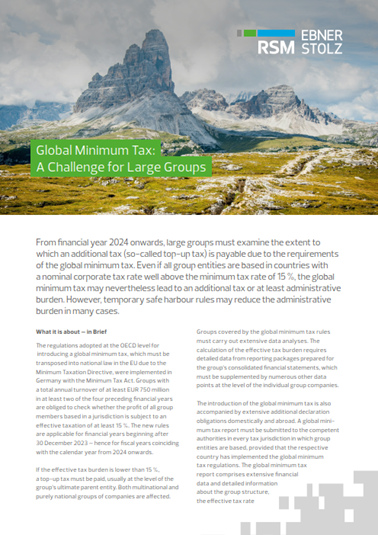 Global Minimum Tax: A challenge for large corporations
Global Minimum Tax: A challenge for large corporationsFrom financial year 2024 onwards, large corporate groups must examine the extent to which a tax increase is payable due to the requirements of the global minimum tax. Even if all group entities are based in countries with a nominal corporate tax rate well above the minimum tax rate of 15 %, the issue of global minimum tax is not resolved. However, temporary relief can be utilised and should temporarily reduce the administrative burden in many cases.
-
 Global Minimum Tax - A challenge for medium-sized companies
Global Minimum Tax - A challenge for medium-sized companiesWith the Minimum Taxation Directive Implementation Act of December 21, 2023, the EU requirements for the introduction of a global minimum tax were transposed into national law. As a result, large medium-sized corporate groups are also obliged to check from the 2024 financial year whether their profits are subject to an effective tax burden of at least 15 % worldwide. In addition to any resulting additional tax burdens and high declaration costs, companies will be faced with extensive investigative tasks in particular. Medium-sized companies, which are often structured as partnerships in Germany, have some additional special features to consider. In this brochure, RSM Ebner Stolz outlines the main features of the global minimum tax regulations in Germany and discusses the special features for medium-sized companies.
-
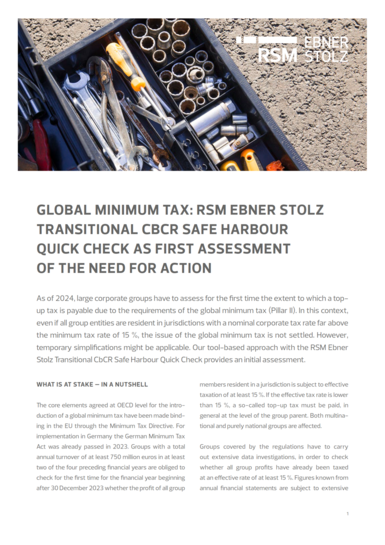 Global Minimum Tax: Ebner Stolz Transitional CBCR Safe Harbour Quick Check as First Assessment of the Need for Action
Global Minimum Tax: Ebner Stolz Transitional CBCR Safe Harbour Quick Check as First Assessment of the Need for ActionAs of 2024, large corporate groups have to assess for the first time the extent to which a top-up tax is payable due to the requirements of the global minimum tax (Pillar II). In this context, even if all group entities are resident in jurisdictions with a nominal corporate tax rate far above the minimum tax rate of 15 %, the issue of the global minimum tax is not settled. However, temporary simplifications might be applicable. Our tool-based approach with the RSM Ebner Stolz Transitional CbCR Safe Harbour Quick Check provides an initial assessment.
-
 Doing Business in Germany
Doing Business in GermanyThis guide to Doing Business in Germany is intended to provide an initial overview of the political, economic, legal and tax environment for investing in this country, so as to facilitate potential investors’ decision-making about a German business commitment.
-
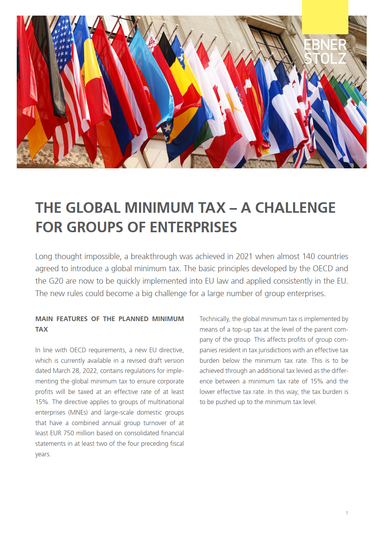 The Global Minimum Tax - A Challenge for Groups of Enterprises
The Global Minimum Tax - A Challenge for Groups of EnterprisesLong thought impossible, a breakthrough was achieved in 2021 when almost 140 countries agreed to introduce a global minimum tax. The basic principles developed by the OECD and the G20 are now to be quickly implemented into EU law and applied consistently in the EU. The new rules could become a big challenge for a large number of group enterprises.
-
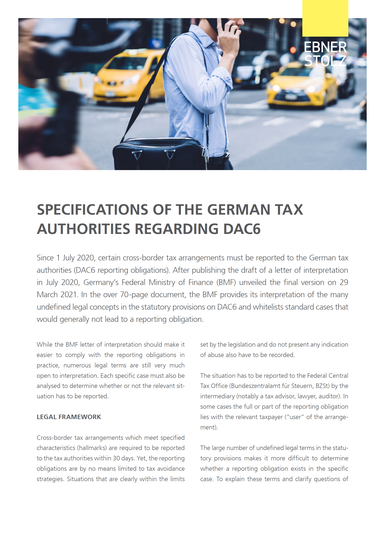 Specifications of the german tax authorities regarding DAC6
Specifications of the german tax authorities regarding DAC6Since 1 July 2020, certain cross-border tax arrangements must be reported to the German tax authorities (DAC6 reporting obligations). After publishing the draft of a letter of interpretation in July 2020, Germany’s Federal Ministry of Finance (BMF) unveiled the final version on 29 March 2021.
-
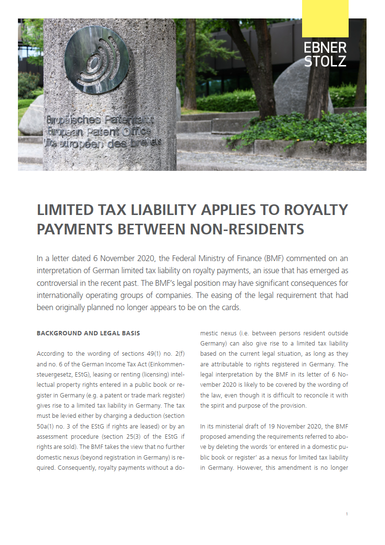 Limited tax liability applies to royalty payments between non-residents
Limited tax liability applies to royalty payments between non-residentsIn a letter dated 6 November 2020, the Federal Ministry of Finance (BMF) commented on an interpretation of German limited tax liability on royalty payments, an issue that has emerged as controversial in the recent past. The BMF’s legal position may have significant consequences for internationally operating groups of companies. The easing of the legal requirement that had been originally planned no longer appears to be on the cards.
